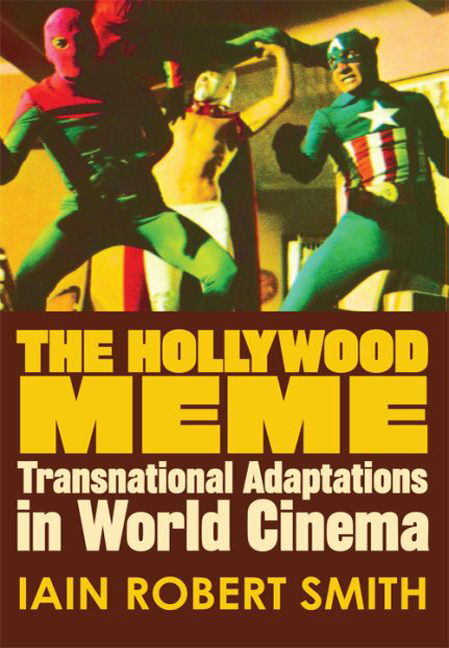Book contents
- Frontmatter
- Contents
- List of Figures
- Acknowledgements
- Introduction
- 1 Tracing the Hollywood Meme: Towards a Comparative Model of Transnational Adaptation
- 2 Hollywood and the Popular Cinema of Turkey
- 3 Hollywood and the Popular Cinema of the Philippines
- 4 Hollywood and the Popular Cinema of India
- Conclusion: Reflections on the Hollywood Meme
- Bibliography
- Index
2 - Hollywood and the Popular Cinema of Turkey
Published online by Cambridge University Press: 26 April 2017
- Frontmatter
- Contents
- List of Figures
- Acknowledgements
- Introduction
- 1 Tracing the Hollywood Meme: Towards a Comparative Model of Transnational Adaptation
- 2 Hollywood and the Popular Cinema of Turkey
- 3 Hollywood and the Popular Cinema of the Philippines
- 4 Hollywood and the Popular Cinema of India
- Conclusion: Reflections on the Hollywood Meme
- Bibliography
- Index
Summary
In the two centuries leading up to World War II, the ongoing attempts at westernizing Turkey were modelled on European patterns and precedents. By the mid-1940s, however, Europe was in ruins. At least for the time being, it could no longer act as the object of fascinated desire it had previously been. The United States inherited this mantle.
Nezih Erdoğan (2004: 121)Our school is foreign cinema, I'd like to stress that. We learnt the profession first of all through observation.
Tevfik Fikret Ucak (2006)Every act of borrowing is in effect a reinvention
Peter Metcalf (2002: 16)In the Turkish sci-fi comedy G.O.R.A. (2005), writer/star Cem Yilmaz thoroughly lampoons many of the Americentric traditions of Hollywood science fiction. After the film opens on a space station in which all the characters are speaking English, one character points out the anomaly, pleading, ‘Can we not have it in Turkish?’. The film then restarts, only this time with everyone – including the alien races – ‘conversing in the Turkish language and using Turkish lira to trade. In this alternate universe, it is not America that has colonised the peoples’ consciousness – to paraphrase those infamous words of Wim Wenders – but Turkey. This pointed inversion of the Americentrism in Hollywood science-fiction narratives, however, is balanced with an obvious affection for those same films, with G.O.R.A. also offering loving homages to such iconic US films as Star Wars (1977) and The Matrix (1999).
This tension between oppositional critique and mimetic reverence illustrates one of the many layers of ambivalence that lie at the heart of transnational processes of cultural exchange. While the film is undoubtedly offering a critique of the Americentrism in science-fiction narratives, it is also drawing upon and imitating elements from those same cultural products. Indeed, these processes of borrowing and adaptation are not solely a contemporary phenomenon. Transnational adaptation has a long history within Turkish popular culture, ranging from the literary borrowings of the Edebiyyât-ı Cedîde (New Literature) movement in the early twentieth century through to the more recent musical reworkings of bands like the Dolapdere Big Gang.
- Type
- Chapter
- Information
- The Hollywood MemeTransnational Adaptations in World Cinema, pp. 34 - 74Publisher: Edinburgh University PressPrint publication year: 2017



